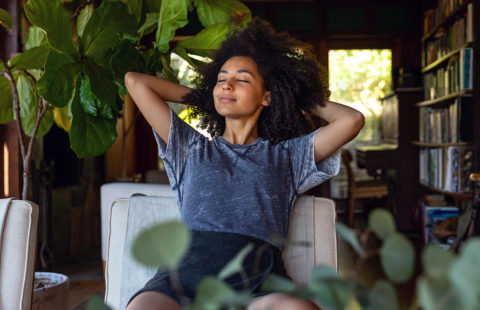An Extrovert’s Guide to Embracing Mindfulness and Alone Time

If this pandemic has taught us anything it’s that isolation isn’t easy, and for those who get their energy from spending time with and around others, lockdown has been especially difficult. That’s all the more reason to start embracing mindfulness as part of your self-care routine, even if it may feel initially, boring, rigid or next to impossible.
“Extroverts may be reluctant to practice self-care because we often frame it as solo or isolated activities, like having a soak in the tub, passive meditation and quiet time,” says Elaisha Jade, meditation teacher and founder of Your Mindful Meditation. But what if your self-care routine didn’t have to look like the typical a.m. yoga or pin-drop silent meditation? What if extroverts could custom-design a wellness routine and even lean into alone time? Here are a few ways to do exactly that.
Try an active meditation
If words like “mindfulness” or “meditation” feel daunting or about as appealing as a math class, an active meditation might be more your style. As Jade points out, passive meditation can look like laying down on your back in shavasana (the final resting pose), focusing on your breath, or sitting still in a quiet space. Active meditation, on the other hand, can look like dancing, running or walking with a calming mindset. While it may be hard to achieve initially, this means being able to into a meditative and relaxed state while performing everyday activities. Allow yourself to think outside the box. As Jade learned while studying meditation in Goa, India, rules are meant to be broken and meditation doesn’t need to be so stiff. “My Guru Shiva taught me that we didn’t have to take ourselves so seriously. We could laugh in meditation, journal and we could meditate together in community,” she says.
Reframe how you think about solitude
Alone time doesn’t have to feel lonely or boring, and it certainly shouldn’t be viewed as wasted time that could’ve been spent on social activities (though FOMO sufferers might see it that way). “Since extroverts are framed as needing human contact to be energized, many think that means they have to be around people all the time to feel complete or whole,” says Jade, “but alone time for extroverts can be extremely valuable.” Think of your time spent solo cooking or repotting your plants as time to view situations from afar or to further build and strengthen your relationship with yourself.
Jump into a virtual club or class
There’s no law that says that all wellness practices must be done in silence and solitude. In fact, Jade encourages making it social. “Self-care is about focusing on the self, not anyone else’s ideas of self-care. So if an extrovert requires people around to feel like themselves, then they should lean into it.” It may be a pandemic, but there are plenty of great virtual experiences to take part in. Book clubs, virtual ecstatic dance meet-ups, safely-distanced walking groups, and mindfulness classes (yes, it’s a thing!) aren’t in short supply. In fact, something like a mindfulness class might even help an extrovert commit to the time slot and the end-of-class sharing could do a world of good.
If pre-pandemic, girls nights were the best part of your week, start them up again via Zoom or join a virtual mixer class. For a drink that’ll add a refreshing touch to your stay-at-home party, consider Quatreau’s cannabis-infused sparkling waters. Available in a variety of fresh fruity flavours including Ginger and Lime, Cucumber and Mint, Passionfruit and Guava, and Blueberry and Acçai—these crisp beverages, which are available in Canada from Canopy Growth, might be just the thing to bring pause to a Friday night.

Keep an audio journal
If you’re an extrovert, you might also happen to process your thoughts better verbally. If the journaling attempts didn’t really take off, consider voice note journaling as an alternative. It’s faster and for many, may even be more effective. “It’s a great way to sort out your thoughts and even review your day by speaking them out loud, but only to yourself,” says Jade.
This communication is intended for adults only and should not be shared with minors. There are risks associated with cannabis use. For information, search online “Health Canada – cannabis health effects.
*This product contains minimal amounts of THC.






